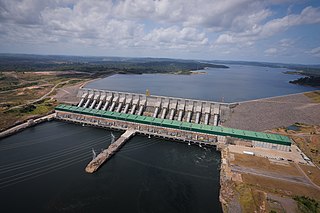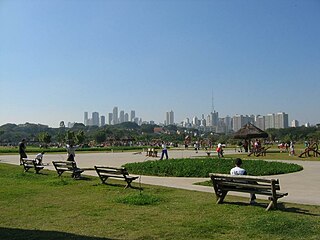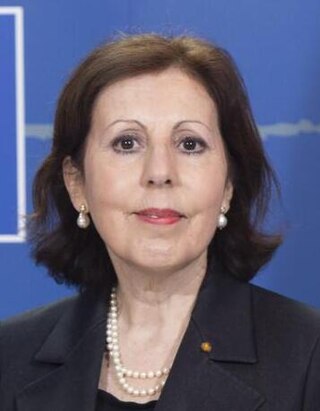Related Research Articles

EDP is a Portuguese electric utilities company, headquartered in Lisbon. It was founded in 1976 through the merger of 14 nationalised electricity companies.

Renewable energy progress in the European Union (EU) is driven by the European Commission's 2023 revision of the Renewable Energy Directive, which raises the EU's binding renewable energy target for 2030 to at least 42.5%, up from the previous target of 32%. Effective since November 20, 2023, across all EU countries, this directive aligns with broader climate objectives, including reducing greenhouse gas emissions by at least 55% by 2030 and achieving climate neutrality by 2050. Additionally, the Energy 2020 strategy exceeded its goals, with the EU achieving a 22.1% share of renewable energy in 2020, surpassing the 20% target.

Centrais Elétricas Brasileiras S.A. is a major Brazilian electric utilities company. The company's headquarters are located in Rio de Janeiro.

Galp Energia, SGPS, S.A. is a Portuguese multinational energy corporation, headquartered in Lisbon, Portugal. Galp consists of more than 100 companies engaged in every aspect of the oil and natural gas supply, hydrocarbon exploration and production; refining, trading, logistics and retailing; co-generation and renewable energy. Galp was founded in 1999 through the merger of Petrogal, Gás de Portugal and Transgás. As of 2020, it is the largest oil and gas group in Portugal, where it distributes gas and sells petrol.

Renewable energy in Portugal was the source for 25.7% of total energy consumption in 2013. In 2014, 27% of Portugal's energy needs were supplied by renewable sources. In 2016, 28% of final energy consumption in Portugal came from renewable sources.

Brazil is the 7th largest energy consumer in the world and the largest in South America. At the same time, it is an important oil and gas producer in the region and the world's second largest ethanol fuel producer. The government agencies responsible for energy policy are the Ministry of Mines and Energy (MME), the National Council for Energy Policy (CNPE), the National Agency of Petroleum, Natural Gas and Biofuels (ANP) and the National Agency of Electricity (ANEEL). State-owned companies Petrobras and Eletrobras are the major players in Brazil's energy sector, as well as Latin America's.

The Belo Monte Dam is a hydroelectric dam complex on the northern part of the Xingu River in the state of Pará, Brazil. After its completion, with the installation of its 18th turbine, in November 2019, the installed capacity of the dam complex is 11,233 megawatts (MW), which makes it the second largest hydroelectric dam complex in Brazil and the fifth largest in the world by installed capacity, behind the Three Gorges Dam, Baihetan Dam and the Xiluodu Dam in China and the Brazilian-Paraguayan Itaipu Dam. Considering the oscillations of river flow, guaranteed minimum capacity generation from the Belo Monte Dam would measure 4,571 MW, 39% of its maximum capacity.
The electricity sector in Argentina constitutes the third largest power market in Latin America. It relies mostly on thermal generation and hydropower generation (36%). The prevailing natural gas-fired thermal generation is at risk due to the uncertainty about future gas supply.

Snam S.p.A. is an Italian energy infrastructure company.

The Ministry of the Environment and Energy is a Portuguese government ministry. The Ministry was formed in 2013 by narrowing the scope of the Ministry of Agriculture.

Cape Verde is a net importer of energy, with no significant fossil energy resources. As of 2016, 176,743 tonnes of fuel were sold on the internal market. Electricity production was 443 GWh in 2016, of which 81% from thermal power, 17% from wind power and 1.4% from solar power. The main electricity producing company of Cape Verde is Electra. Electra serves all islands of Cape Verde except Boa Vista, where electricity and water are produced and distributed by the public-private company Águas e Energia de Boavista. Other smaller electricity producers are Cabeólica, which operates four wind parks, Águas de Ponta Preta on the island of Sal, and Electric Wind on Santo Antão.
Votorantim S.A. is a permanently capitalized investment holding company, with a long-term investment approach. Its portfolio companies operate in 16 countries and in different economic sectors, as building materials, finance, aluminum, clean and renewable energy, metals and mining, orange juice, long steel, growth, real estate, and infrastructure.
The EDP Cernavodă Wind Farm is located in Cernavodă, Constanța County, Romania. It has 46 individual wind turbines, each with a nominal output of around 3 MW, with a total capacity of 138 MW. This capacity is sufficient to power over 85,000 homes. The project, which involved a capital investment of approximately €200 million, was commissioned between 2010 and May 2011.
Grupo Opaia SA is a holding company operating under Angolan law based in Luanda, Angola, running projects in civil construction services, solar energy technology, drinking water systems, hotel service and tourism, agriculture, finance and more. It was founded by the Angolan Agostinho Kapaia, from Huambo, in 2002. From the year 2012 it began to be present on a national scale while it is planned to cover every province with its services. Most of the projects are yet in an early stage, but the companies Greenpower and NBASIT and the projects Meña of Opaia Water and Casa Feliz of Opaia Construction already got a lot of attention. For reasons of purchase, investment and international knowledge among others, there are offices abroad in Lisbon in Portugal, São Paulo in Brazil, Guangzhou in China, Miami in the US and the main office is in the own capital Luanda.
The Sino-Spanish Association for Energy and Sustainability (ASEES) is a Spanish non-profit organization founded in 2009 by Cosme de Arana for the promotion of bilateral cooperation between China and Spain in the renewable energy and environment sectors. It aims to build a bridge between the two countries to promote commercial and technological exchange.
The Uruguayan savanna ecoregion used to be covered by grasslands, palm savannas, and gallery forests along the Uruguay, Negro, Yaguarí, Queguay, and Tacuarembó rivers. Unfortunately, agriculture and cattle ranching have heavily altered these natural communities. The savannas are critically endangered because there are few small isolated patches of intact habitat remaining. The whole ecoregion has been severely altered by cattle ranching, one of the main pillars of the national economy in Uruguay. About 80% of Uruguayan territory is used for cattle ranching on natural and artificial savannas.

EDP Brasil is one of the largest Brazilian electric utility companies. It is a subsidiary of EDP - Energias de Portugal in Brazil. The company was founded in 1996 in São Paulo.

Villa-Lobos State Park is a park in São Paulo, Brazil. It is named after composer Heitor Villa-Lobos, and is located next to Pinheiros River. It was created in 1989 on a site that was previously used as a rubbish tip. The park now has around 37,000 trees. It hosts the annual Aberto de São Paulo.

Maria da Graça Martins da Silva Carvalho is a Portuguese professor, engineer, and politician of the Social Democratic Party who has been serving as Minister of Environment and Energy in the government of Prime Minister Luís Montenegro since 2024.

The Institute of Physicochemistry of Materials, Environment and Energy is a chemistry research centre with double dependence shared among the University of Buenos Aires (UBA) and Argentina's national research council CONICET. It is located at the Faculty of Exact and Natural Sciences Pabellón II building, in the Ciudad Universitaria complex.
References
- ↑ (in Portuguese) Banif e Fomentinvest lançam primeira corretora de carbono em Portugal, ionline (January 17, 2010)
- ↑ Fomentinvest, Bloomberg Businessweek
- ↑ (in Portuguese) Passos renuncia à Fomentinvest Archived 2011-10-05 at the Wayback Machine , Expresso (April 7, 2010)